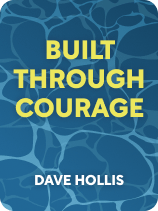

This article is an excerpt from the Shortform book guide to "Built Through Courage" by Dave Hollis. Shortform has the world's best summaries and analyses of books you should be reading.
Like this article? Sign up for a free trial here.
What’s the key to overcoming barriers to change? What obstacles will you face on your self-improvement journey?
Changing your life for the better sounds like a great idea until you hit major roadblocks. As Built Through Courage by Dave Hollis says, these roadblocks are your biggest fears and the expectations people have for you.
Discover how to knock these obstacles down so you can make the necessary changes in life.
Change Your Circumstances
To actually change means to take actions that help you achieve your purpose. Hollis points out, however, that you can only have one priority at a time and you’ll need to overcome barriers to change. If you focus on one specific goal, you’re more likely to achieve that goal than if you split your attention among several. This will help ensure that all your actions are focused solely on achieving your purpose.
(Shortform note: In Essentialism, Greg McKeown says that many of us waste time on minor, nonessential things that distract us from the truly important things in our lives. McKeown discusses this in the context of activities, but the same idea applies to goals: We tend to accumulate them over time without much thought. This creates a packed schedule that doesn’t help you achieve your main goal: your purpose. Some of these activities or goals may be good and enjoyable, but they don’t ultimately serve you and must be dropped. For example, you may enjoy going dancing every night, but if doing so causes you to be exhausted and struggle at work, you should reduce the amount of time you spend dancing.)
There are two main barriers to focusing on your purpose and changing your circumstances to achieve it: fear and expectations.
Barrier #1: Fear
Fear is the biggest barrier to changing your circumstances, Hollis says. Fear paralyzes you, preventing you from fulfilling your purpose. This happens because humans have a natural tendency to imagine and fixate on the worst possible future scenarios, which traps you in your fear. For instance, Hollis experienced this when going through his divorce. He was so afraid of losing his family and his sense of identity as a husband that he struggled to prepare himself for single life.
(Shortform note: You become increasingly trapped by a fear when you actively try to avoid it, some psychologists suggest. When you avoid a fear, you reinforce the idea that it’s a threat that must be avoided and give yourself a psychological reward for that avoidance (the reward being a feeling of relief at not having to deal with your fear). This encourages you to keep avoiding it. However, ignoring a problem doesn’t fix it. Often, the problem worsens, increasing your fear and making it harder to achieve your purpose. For Hollis, avoiding his fears didn’t stop the divorce; it only made him feel blindsided whenever he was forced to acknowledge it—for example, when he had to make child custody arrangements. Hollis could only begin healing after overcoming his fears.)
Barrier #2: Expectations
The second major barrier to changing your circumstances to achieve your purpose is the expectations people have for you, Hollis says. You’re so focused on fulfilling expectations others have put on you that you can’t work to achieve your purpose.
(Shortform note: Some people are more vulnerable to being trapped by expectations, according to Gretchen Rubin’s The Four Tendencies. She says there are four kinds of people: Those who are motivated by internal (your own needs and wants) and external (other people’s needs and wants) expectations, those who are motivated by one or the other, and those who aren’t motivated by either. If you’re motivated primarily by external expectations, you’re arguably most vulnerable, as you’ll struggle to recognize or fulfill your own needs and wants, which can make it difficult to identify and achieve your purpose. Counter this tendency by finding an accountability partner to impose an external expectation that you’ll fulfill your own needs, wants, and purpose.)
Expectations trap you in fear, Hollis adds. You’re afraid to disappoint others by dismissing their advice or living in a way they don’t approve of. Thus, you prioritize these expectations above your own desires and purpose, leading you to feel unhappy and unfulfilled. The expectations become a restrictive belief: You feel that you can’t fulfill your purpose because you must fulfill what others expect of you instead.
(Shortform note: To a certain extent, being afraid to disappoint others is necessary to maintaining a healthy society: If you don’t want to disappoint others, you’re less likely to break laws that keep society functioning, according to some psychologists. However, this fear becomes unhealthy when you attach your sense of well-being to other people’s opinions—you can’t feel good about yourself unless other people approve of you. One of the main steps to overcoming this fear is realizing that other people’s feelings are their business and you have no control over whether they approve of you. The only thing you can control is whether you approve of your decisions.)
Overcome expectations by challenging your restrictive beliefs surrounding them and committing to living according to your values rather than others’. Analyzing the source of your beliefs can help you recognize when other people’s expectations are unfair, unhealthy, and negatively influencing your behavior. You can then overcome these beliefs to refocus on living in a way that makes you happy, aligns with your goals and values, and drives you toward your purpose.
(Shortform note: When you start pursuing your purpose, it’s arguably important to begin challenging your restrictive beliefs and eschewing others’ expectations immediately to avoid making expectation-driven behaviors a habit. Repeatedly doing something strengthens your neural pathways around that behavior, making you more likely to automatically engage in it in the future. It’ll be much easier to quit people-pleasing if you challenge this behavior before it becomes strongly habitual. You could also use this habit-building mechanism to your advantage—by repeatedly behaving in a way that truly aligns with your values and purpose, you’ll strengthen a different, fulfilling neural pathway and make purposeful behavior a habit instead.)

———End of Preview———
Like what you just read? Read the rest of the world's best book summary and analysis of Dave Hollis's "Built Through Courage" at Shortform.
Here's what you'll find in our full Built Through Courage summary:
- Why the key to a fulfilled life is achieving your unique purpose
- How to identify and achieve the role you're meant to fill
- How to overcome the two barriers to reaching your potential






